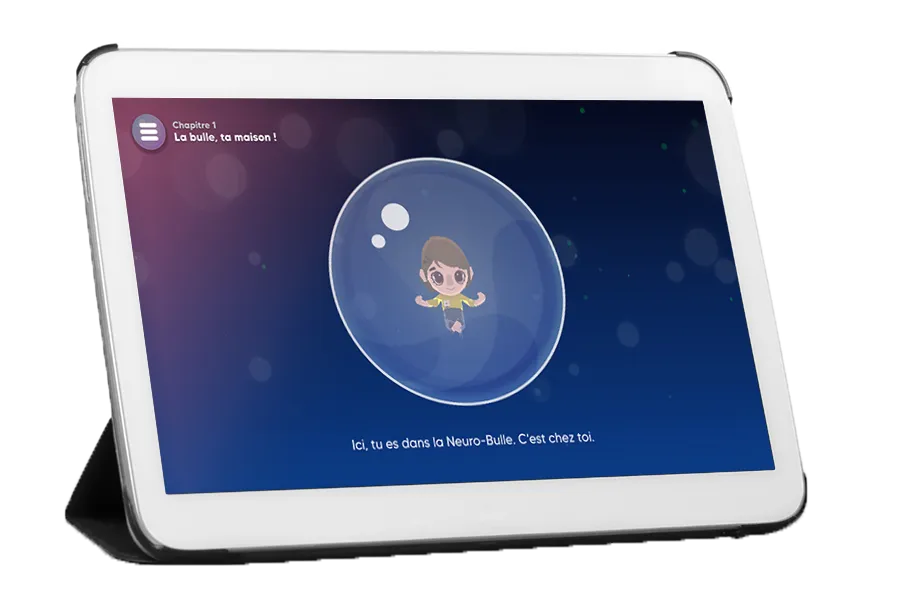What is a neuropsychologist?
The neuropsychologist is a professional specializing in the study of the relationship between the brain and human behavior. They devote their time to understanding how brain dysfunctions or neuroatypisms influence cognitive and emotional processes.
What’s the difference between a psychologist and a neuropsychologist?
A psychologist is a professional trained in psychology. Their job is to understand and treat the emotions, thoughts and behaviors of individuals, including children. They use methods adapted to their specialization and age: clinical, cognitive, developmental psychology, etc., to improve their well-being and development.
A neuropsychologist, on the other hand, is a psychologist specializing in the study of the relationship between the brain and behavior. He treats cognitive and behavioral disorders that may result from neurodevelopmental disorders or brain damage. The neuropsychologist’s job is to help his or her patients regain their quality of life and independence in everyday life.
What is the neuropsychologist’s role?
Defining the patient’s cognitive profile
The neuropsychologist’s aim is to identify any alterations in cognitive functions, but also to observe those that are preserved and which can be relied upon to manage disorders. For each patient, the neuropsychologist assesses the type of cognitive rehabilitation program that may be effective in restoring or improving cognitive function.
Psychological support
As a healthcare professional, the neuropsychologist also offers psychological support to patients and their families, to help them cope with the consequences of cognitive and behavioral disorders.
Differential diagnosis
Differential diagnosis is also part of the neuropsychologist’s mission. Let’s take the example of ADHD (Attention Deficit Hyperactivity Disorder): several cognitive, or even physical, disorders can be related to ADHD. We need to be able to differentiate between these different disorders in order to implement the most appropriate treatment possible.
Collaboration with other healthcare professionals
Where relevant, the neuropsychologist works with other professionals: neurologist, psychiatrist, psychomotrician, orthophonist or ergotherapist to ensure comprehensive patient care.
Why consult a pediatric neuropsychologist?
If your child’s teacher complains that he or she is having trouble concentrating, is often in a daze or, on the contrary, is too impulsive in his or her exercises at school, it may be useful to carry out a neuropsychological assessment. The aim of the assessment is to identify possible attention disorders or other cognitive difficulties that impact on his school performance, such as dyslexia or dysorthographia for example.
Inattention and concentration disorders
If a child shows signs of Attention Deficit Disorder with or without Hyperactivity (ADHD), a neuropsychologist can help him or her assess the disorder and consider treatment, as well as recommend appropriate school-based solutions.
Problematic behaviors
Behaviors such as aggression, excessive anxiety or frequent tantrums may indicate emotional or behavioral problems. A neuropsychologist assesses these behaviors and provides recommendations on how to manage them better. Beware, however, that certain behaviors are sometimes considered “normal” at a certain age, when the child’s frontal cortex is still immature 😉
Developmental delay
A delay in the child’s general development, both cognitive and social, may necessitate a neuropsychological evaluation, in order to rule out a possible neurodevelopmental disorder, such as autism, developmental delays, or a learning disability.
Head injuries or medical conditions
Children who have suffered a head injury or are suffering from neurological illnesses may need neuropsychological follow-up to assess the impact on their cognitive and emotional functions, and put in place strategies to restore or compensate on a daily basis.
Evaluation of high intellectual potential (HPI)
Children showing signs of high intellectual potential can be assessed by a neuropsychologist, who will carry out an IQ test as a first step in identifying possible HPI functioning. This assessment can be supplemented by questionnaires for parents and teachers, and other qualitative methods.
To refine the diagnosis and develop specific support strategies, a consultation with a neuropsychologist may be suggested.
Neuropsychological assessment: what is it?
The neuropsychological assessment is used to determine the child’s cognitive profile in order to identify his or her strengths, areas for improvement, or possible cognitive deficits, and to propose appropriate treatment.
The assessment generally lasts several hours, and begins with a discussion with the child and his or her parents. This is the anamnesis, which provides an overview of the child’s development and highlights any difficulties present in the child’s day-to-day life.
Next, a series of cognitive tests is carried out, and questionnaires are sometimes filled in by the parents to gather as much information as possible about the child’s functioning. The assessment concludes with a presentation of the results. A decision is then taken as to whether or not treatment is appropriate, and parents are given a range of advice adapted to the disorder identified (resources, suggestions, concrete tools). Advice on adaptations at school may also be considered.
How does a neuropsychological assessment work?
The neuropsychologist generally follows a structured process to assess the patient’s cognitive profile.
1. Anamnesis
At the first meeting, the neuropsychologist explains the objectives of the interview and answers any questions the patient or family may have. An in-depth discussion is held to gather information on medical, family, school and work history, as well as current symptoms and concerns.
2. Neuropsychological assessment
This is followed by a series of tests to assess various cognitive functions. The neuropsychologist observes the child’s behavior during the tests and takes notes.
The neuropsychological evaluation lasts several hours, and can be divided over several sessions to avoid fatigue and ensure accurate results. In principle, these tests are carried out without the parents being present.
Questionnaires are sometimes filled in by the parents to gather as much information as possible about the patient’s functioning. It is not uncommon for the clinician to ask the child’s teacher to fill in one too.
3. Analysis and interpretation of results
The neuropsychologist analyzes the test results, comparing them with norms established for similar populations (in terms of age, sex, etc.). The results are interpreted to identify cognitive strengths and weaknesses, in order to formulate diagnostic hypotheses.
4. Reporting the results
The neuropsychologist prepares a detailed report of results, including test scores, behavioral observations and interpretations. He then organizes a session to explain the results to the patient and/or his family. He discusses the conclusions, the implications of the diagnosis and proposes recommendations. This is an opportunity for the family and child to ask questions and discuss next steps.
5. Follow-up
Depending on the results, the neuropsychologist proposes specific recommendations:
- Cognitive therapies,
- Coping strategies,
- Educational interventions,
- Referral to other specialists,
- Etc.
If necessary, follow-up sessions are scheduled to reassess progress.
Does the parent have to be present?
Yes, parents should be present during the history-taking, whatever the child’s age, as they provide essential information and help the child feel at ease.
During tests, the parent will generally wait outside to minimize distractions, except in the case of particularly young children who need their parent’s presence to feel safe.
Parents are also present to discuss initial concerns with the neuropsychologist, and for the results feedback at the end of the session.
How much does a consultation with a neuropsychologist cost?
- A consultation with a neuropsychologist can cost between 60 and 75 euros for a one-hour session.
- The price of a neuropsychological assessment can vary from €300 to €500, depending in particular on the extent of the tests performed.
Is the consultation reimbursed?
Consultations with a neuropsychologist are not reimbursed by social security.
Some complementary health insurance plans or health insurers offer flat-rate reimbursements for psychological or neuropsychological consultations. Check with your insurer to see if you are eligible for reimbursement.
In France, the Centres Médico-Psychologiques offer free or reduced-rate consultations. These centers are often attached to public hospitals and are accessible on medical referral.
As they are not automatically reimbursed, access to a neuropsychologist comes at a price, and unfortunately not all families can benefit from them. Contact the organizations mentioned to find out more about possible reimbursement.
How to become a neuropsychologist
In France, to become a neuropsychologist, a rigorous training course is required: obtaining a bachelor’s degree in psychology, followed by a master’s degree in neuropsychology, which can be completed by a doctorate.
During these studies, the future neuropsychologist acquires in-depth knowledge of neurosciences, medical imaging, cognitive and clinical psychology, as well as assessment and cognitive rehabilitation techniques. Training includes practical internships where students apply their skills under the supervision of experienced professionals.
Required skills
- A solid understanding of brain functions and neurological mechanisms.
- The ability to administer and interpret a variety of neuropsychological tests.
- Communication skills to explain results to patients and their families.
- An ability to develop individualized treatment plans based on patients’ specific needs.
- Empathy skills needed to accompany families sometimes exhausted by a long course of care before consulting a neuropsychologist 😉
The Babaoo recap
- The pediatric neuropsychologist assesses and manages cognitive and behavioral disorders in children.
- He helps understand the impact of brain dysfunction on development.
- Consulted for school problems, ADHD, problem behaviors or developmental delay, he offers targeted interventions to improve school and social life.
- Although neuropsychology sessions are not reimbursed by social security, some financial aid is available to support families.





